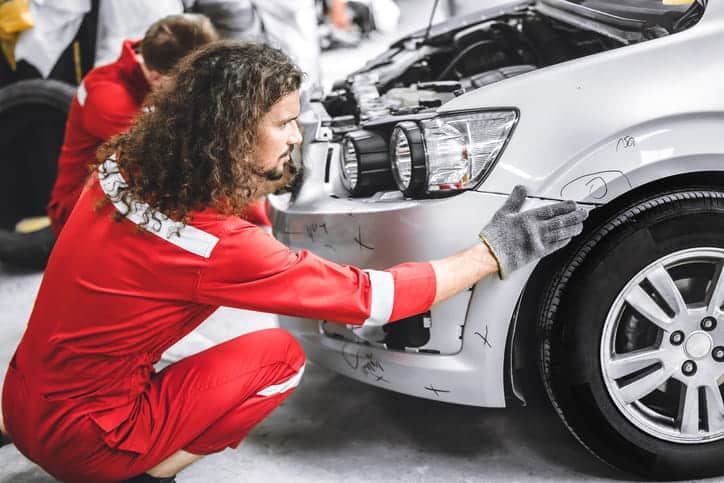Automobiles are essential for most people. Owning a passenger vehicle enables people to commute to work, run errands, and enjoy recreational and social outings. The fact that over 282 million vehicles were registered in the U.S. in 2021 demonstrates how much value people place on vehicle ownership.

Vehicle purchases are also among the most expensive purchases most people make. Despite people’s hefty financial investment, vehicles lose value over time. Being in a car accident can also cause a vehicle’s value to depreciate. If you’ve been in an accident, you may wonder how the accident impacts your vehicle’s value and the factors that affect that diminished value.
Contact the expert car accident attorneys with Jack Bernstein, Injury Attorneys, today to learn how we can help you after your accident.
What Does Depreciate Mean?
Depreciation refers to the decline in something’s value. Some things appreciate over time, while others depreciate. Whether an asset appreciates or depreciates depends on multiple factors, such as:
- Availability
- Demand
- Economic factors
Although antique or collector cars may increase in value over time, most vehicles depreciate or lose value. Their value depreciates when you buy them, and the longer you own a vehicle, the more it depreciates.
Diminished Value Claims
Following a car accident, a diminished value claim occurs when the car is subsequently less than what it was originally worth prior to the damage. These types of claims are common when the vehicle is relatively new.
The overall concept behind diminished claims is that consumers will likely not pay as much for a damaged vehicle as they would for the same vehicle without any such damage. By filing a diminished value claim, you may be able to regain the loss to your vehicle’s value following the accident, regardless of whether you seek to sell your car.
Were you injured in a car accident? Contact Jack Bernstein, Injury Attorneys, now.
Types of Diminished Values
There are various types of diminished values that can be important to understand if you are considering filing a diminished value claim. The different types of diminished values include:
- Immediate diminished value
- Inherent diminished value
- Repair-related diminished value
Your experienced personal injury attorney can help you assess which types of diminished values are relevant to your particular case.
About Jack G. Bernstein Esq.
Personal Injury Lawyer

For more than 40 years, personal injury lawyer Jack G. Bernstein — a member of the Florida State Bar Association, the Hillsborough Bar Association, and the Clearwater Bar Association — has protected the rights of individuals injured by a negligent party.
Mr. Bernstein has the expertise to handle various injury cases, including, but not limited to, car accidents, medical malpractice cases, cruise ship accidents, accidental drownings, wrongful death lawsuits, along with most injury and catastrophic occurrences, and legal malpractice issues.
With a staff of approximately 40 people, including six lawyers and 34 support personnel, Jack Bernstein, Injury Attorneys, handles every type of personal injury and accident case throughout Tampa, Sarasota, St. Petersburg, and Clearwater, FL. Our office has the legal resources to get the justice you deserve and the maximum recovery for your losses. Schedule your free consultation today; we are always here to help.
Does a Car Lose Value After an Accident?
A vehicle loses value after it’s been in a car accident. Depending on the severity of the damage, car accidents can affect the vehicle’s structural integrity. Structural damage can reduce the car’s safety rating. In some cases, damage from an accident can also trigger other mechanical issues.
How Much Value Does a Car Lose After an Accident?
The amount a vehicle depreciates after a car accident depends on the severity and nature of the damage. You may wonder how much a minor accident affects car values — a minor accident could result in $500 or less lost value. However, severe accidents could cost you thousands in diminished value.
Cars Typically Lose 10 to 30% of Value After a Car Accident
Following a motor vehicle accident, the car itself typically loses approximately 10% to 30% of its value following the damage. However, the loss of value can be as much as 50%, depending on the extent of your damage. It’s important to discuss the extent of your loss of value with your car accident attorney so they can effectively guide you and offer appropriate legal advice about your situation.
Factors That Affect How Much Your Car Depreciates After an Accident
While there are plenty of factors that can affect how much your car depreciates after an accident, some of the most common factors that can influence your vehicle’s depreciation value include:
- How severe the damage is
- How old is the car, and the condition before the accident
- The make and model of the vehicle
- Today’s market value of the car
How To Calculate a Diminished Value
Following an accident, it’s important to understand how to calculate the diminished value, as this value will help you move forward with either filing a claim or selling your vehicle. Once you have sought medical treatment and contacted an attorney, calculating the diminished value of your car should be relatively high on your post-auto accident to-do list.
In order to properly calculate the diminished value of your car, be sure to take the following steps:
- Determine your car’s Blue Book value
- Determine the market value’s 10% cap
- Figure in the damage multiplier
If you are struggling to determine the appropriate diminished value of your vehicle, the experienced car accident attorneys at Jack Bernstein, Injury Attorneys, are eager to assist.
Is There a Way To Receive Compensation for the Diminished Value After a Car Accident?
You can file an accident insurance claim to cover the cost of repairs after your accident. You can also submit a claim for the diminished value. You’ll need to have your vehicle repaired first and have it appraised. Deduct the vehicle’s value after it’s repaired from its value before the accident to determine the diminished value amount you can claim.
Filing a Diminished Value Claim
In certain situations, filing a diminished value claim can be the best option for victims of an automobile accident.
Should I File a Diminished Claim?
If you are wondering whether you should file a diminished claim, you should discuss the situation with an experienced car accident attorney, as they will be able to guide you in the proper direction in terms of legal advice.
Some things you should take into consideration prior to filing a diminished value claim include:
- Your vehicle’s value before the accident: Depending on the value of your car prior to the accident, you may be eligible for substantial repayment, or it may not be worth the time it takes to file a diminished claim
- Comparative negligence — were you partially at fault?: Your ability to be compensated for the diminished value of your vehicle may be impacted depending on the extent to which you are liable for the cause of the car accident
- Make and model (value of the car): The make and model of your vehicle can play an important role in determining whether it is worth it to file a diminished value claim, as a more expensive luxury vehicle may be eligible to receive more compensation than an older, non-luxury vehicle
If you have been involved in a car accident and are considering filing a diminished value claim in Tampa, then be sure to discuss all of these factors with the Florida car accident attorneys at Jack Bernstein, Injury Attorneys.
Can a Car Accident Attorney Help You Recover Diminished Value After Your Accident?
A car accident lawyer fights to protect your rights and seeks compensation for property damage and vehicle depreciation costs incurred after an accident. At Jack Bernstein, Injury Attorneys, we’ll investigate the accident, gather relevant materials, file legal paperwork on your behalf, and negotiate with the at-fault driver and their insurance company. We won’t charge any legal fees until you receive the compensation you deserve.
Jack Bernstein, Injury Attorneys
Free Case Evaluation
No Fees Unless We Win
No upfront fees, no risk, and no out of pocket cost to you or your family.
Entirely confidential – we respect your privacy, consultations are privileged.
Sources:
Heaps, R. (2024). Diminished Value of a Car: Estimations After an Accident.
Leicht, A. (2023). Diminished Value Claims Explained.
Ray, D. What’s Included in My Car Damage Settlement After an Accident?
